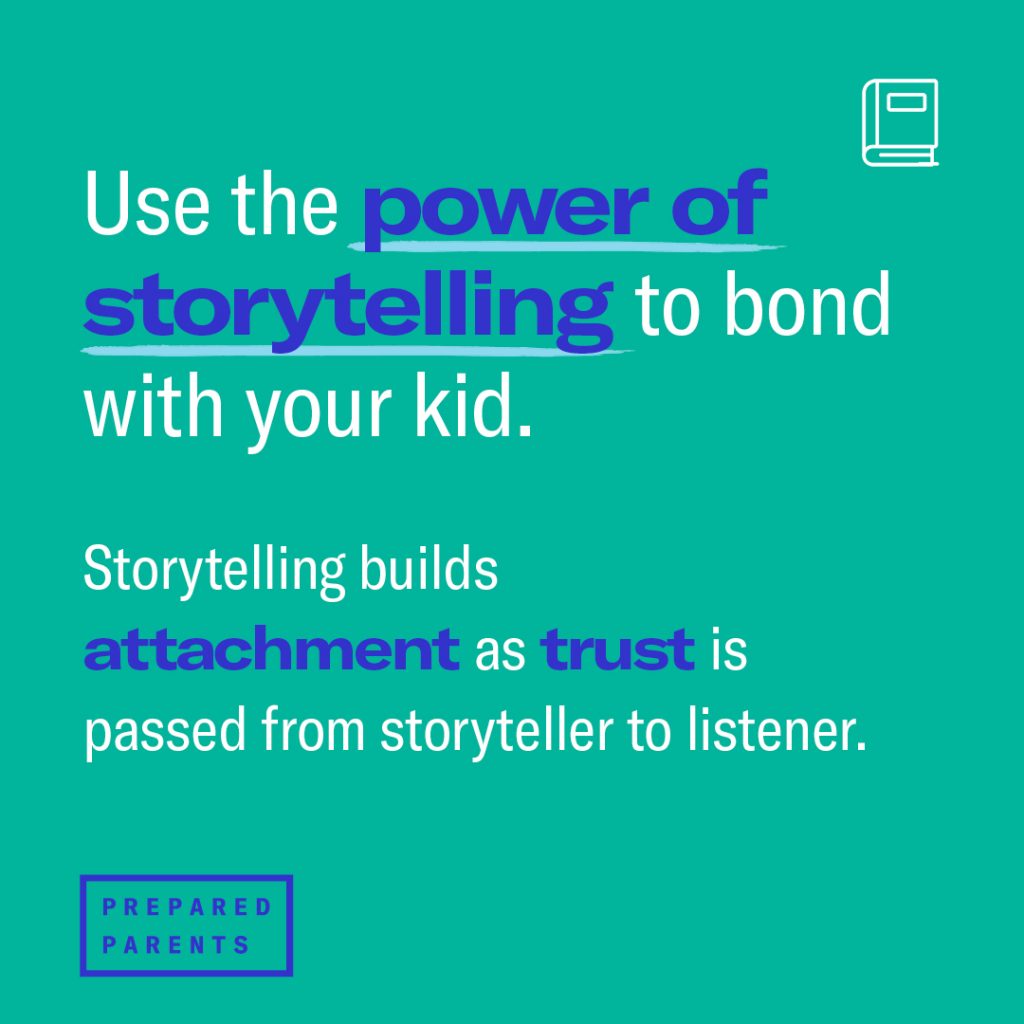Remember that treasured time of sharing a story with your kid? It felt great, didn’t it? That’s because storytelling creates an intimacy that’s hard to capture with most other activities. Its superpower is the relationship between the storyteller and the listener.

“Tell me a story” is not just a kid’s way of asking for attention, it’s a request for a relationship. Storytelling builds attachment, creating a bond of closeness and trust that passes from storyteller to listener. That’s the real value (not just the words being shared) being passed from human to human, parent to child.
There are even more takeaways. Listening to a story helps people focus, remember information, develop empathy, and navigate some of life’s challenges. When the story is about real people and situations, it can also give a kid a sense of direction about how to resolve a personal situation. What kid doesn’t love hearing real-life stories, especially when they’re about the family? Those are the ones they remember the longest.
Sharing stories—whether read or spoken—yields other enormous benefits. Reading to a kid just twenty minutes a day promotes brain development, expands listening skills, builds literacy, and elevates academic performance. According to one study, kids who have books read to them develop more complex language skills. Those who listen to spoken stories demonstrate improved story comprehension. So, it’s a win-win.
Go for it
This time it’s not about quality, it’s about quantity. Show your kid they matter by taking a few minutes to sit together and tell a story. It doesn’t have to be an amazing adventure. Take a cue from your kid. Is there something that happened during the day that you can weave into a tale? Your unique perspective makes you a masterful storyteller. Who knows your child better than you?
Show your soft side
Kids love hearing about embarrassing moments. Tell them yours. Letting your kid see your vulnerability makes it safe for them to tell you theirs.
Turn it over
Engage your kid in the storytelling by taking a pause and asking, what do you think will happen next? Why do you think the story went in that direction? Give kids control of the story and suggest they fill in the action points and develop alternate endings. This gives them agency, helps them to think about resolutions for situations, and allows their creativity to shine.
Be a listener
Listening to your kid’s stories gives you a window into their world. It may reveal their understanding of life events and open up deeper conversations about what concerns them.
“If you’re trying to engage, influence, teach, or inspire others, you should be telling or listening to a story, and encouraging others to tell a story with you.”
-Lani Peterson, professional storyteller and psychologist
Tell it again
Kids love to hear the same story over and over. Adding additional elements and incorporating your kid’s life experience and environment shows them that you’re paying attention.
Take it a step further with a little play
A good story may lead to play as a kid doesn’t want it to end. Your story is the framework they’ll use to explore their imagination. They’ll expand the story, personalize it, and embellish it.
Storytelling has been integral to all cultures since long before the first book was printed. Scientists engaged in more than seventy years of research have determined that it is significant in how we think, speak, and find purpose in our lives. Whether you sit around a campfire like our ancestors long ago or gather in a bedroom, storytelling can become part of your family history and a memory for years to come.

